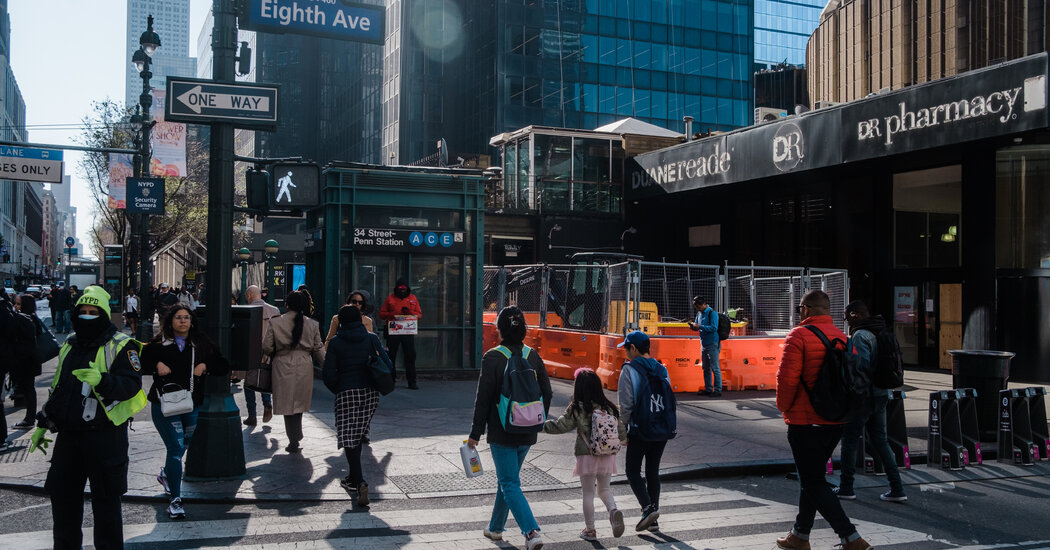In 2020, when Gov. Andrew M. Cuomo unveiled a grand reimagining of Pennsylvania Station to be funded largely by new office towers around the train hub, one landlord stood to reap most of the rewards: Vornado Realty Trust, one of the nation’s largest owners and managers of commercial real estate.
But three years later, the commercial development that would jump start the Penn Station plans has been indefinitely delayed — first by a pandemic shift to remote work, then by rising interest rates and growing fears of a recession.
Now, other firms are rushing to offer alternatives, throwing the future of the stalled project into question. Support for the current plan is eroding among several key state lawmakers, who say it is time to rethink the project’s focus on office buildings since the market for office space is struggling to rebound.
“The whole thing has been a tremendous waste of time, given the collapse of the commercial market,” said State Senator Brad Hoylman-Sigal. He said he still supported renovating the train hub, which is the busiest in North America, but was skeptical of the plan to rezone the area around Penn Station for millions of square feet of office space. “Its usefulness seems highly questionable.”
The redevelopment of the neighborhood around Penn Station would be one of the largest commercial real estate projects in American history. The project would allow developers to build up to 10 new skyscrapers that would otherwise not be permitted and would siphon off revenue from the new towers to help pay for the overhaul of the run-down train station.
The project’s future — and the renovation of the station itself — now rests with Mr. Cuomo’s successor, Gov. Kathy Hochul. While she has backed the proposal, she has remained quiet in recent months about whether she would modify it in light of Vornado’s hesitation about going forward.
Vornado’s delay has renewed criticism over how state officials involved the developer in the project from the very start. State Senators Liz Krueger and Leroy Comrie have urged the state agency overseeing the redevelopment, Empire State Development, to re-evaluate the process. Ms. Krueger represents the Penn Station neighborhood, and Mr. Comrie serves on the state’s Public Authorities Control Board, which would have to approve each of the towers before construction could begin.
“We can’t afford to wait,” Mr. Comrie said. “There are many other ways to finance this project.” He added that three groups had shown him proposals in recent weeks that would help pay for the Penn Station overhaul in other ways. One group is ASTM North America, an infrastructure company led by Patrick J. Foye, a former chief executive of the Metropolitan Transportation Authority; Mr. Comrie declined to describe the other proposals.
The ASTM proposal has impressed key legislators and civic leaders. It would create a new aboveground station around Madison Square Garden, and the firm’s officials have said the plan would not rely on revenue from tower construction. Ms. Hochul’s office declined to answer specific questions about ASTM’s plan and the other proposals.
Transportation in New York City
“Governor Hochul is committed to ensuring we have a world-class Penn Station that improves the commuter experience and puts New Yorkers first, and is continuing to work with all stakeholders toward that goal,” her spokesman, Justin Henry, said.
The extensive redevelopment in the center of New York City has been a long-held ambition of Steven Roth, the chief executive of Vornado, who has spent decades buying up much of the unglamorous stretch of Midtown Manhattan, eager to unlock its potential.
Vornado executives have rushed in recent days to meet with state lawmakers in hopes of shoring up support. Executives have stressed that the company’s delay in construction is temporary but have not specified a time frame, and said that they would prioritize the building of a residential tower, at West 33rd Street and Eighth Avenue, before an office. Vornado owns several high-profile properties in the neighborhood, including the Penn 1 office tower, the former Hotel Pennsylvania and the Manhattan Mall.
A spokesman for Vornado said the firm fully supported the state’s rezoning plan, and noted that it had already invested $200 million in improvements in the area surrounding Penn Station.
Stijn Van Nieuwerburgh, a real estate professor at Columbia University’s business school, said that the Vornado component of the Penn Station project most likely would not be able to break ground for another decade, if not longer.
“Vornado would have been gambling the house if it had gone ahead with their plans,” Dr. Van Nieuwerburgh said. “To build now in a world where we probably have 10 to 20 percent too much office space would be absolute lunacy.”
In a letter to shareholders, Mr. Roth wrote on Friday that Vornado remained committed to its plans around Penn Station but warned that “we are approaching the eye of the economic storm.”
“There is no new debt available for office, so no buying, no selling, no new builds,” Mr. Roth said. “I believe it wise to delay until Covid and the current economic storm are resolved, workers return en masse to the office, construction is further along, etc.”
Vacancies have increased as large tech companies like Meta, which paid some of the highest office rents in Manhattan in recent years, particularly around Penn Station, have laid off thousands of employees and shrunk their office footprint.
The office market is in danger of sliding further. Roughly two-thirds of the leases signed before the pandemic have yet to expire, with many tenants likely to downsize or renegotiate their terms. Nearly a fifth of Vornado’s offices leases in New York City are scheduled to expire before the end of next year, according to its latest quarterly filing.
The project’s postponement has also bought time for some of the loudest critics of the rezoning: tenants of the buildings that would be likely to be demolished for redevelopment.
Opponents of the project have complained that it gives the state broad authority to redevelop the neighborhood with little input from New York City officials, lets developers build bigger buildings than local zoning rules would allow and provides tax breaks, which could reach $1.2 billion, according to one analysis.
A tenants association and local property owners have filed two lawsuits in State Supreme Court seeking to annul the General Project Plan, arguing in part that the state failed to show how the tower development would help pay for the transit improvements.
Vornado executives argued in affidavits that the plan is about more than remodeling the train hub, including work that the firm has done to add new entrances and expand passageways to the station.
Before Vornado announced a pause, the state had said the last of the 10 towers would probably not be complete until 2044, possibly a decade after the reconstruction of Penn Station. The plan can only be annulled by the board of the Empire State Development, or by court order.
Gene Sinigalliano, 66, would be forced out of his rent-stabilized, $1,064-a-month loft if the state were to proceed with the rezoning plan, expanding Penn Station to the blocks south of it and building up to 12 additional tracks. The expansion would require federal approval, and his mixed-use, prewar building would have to be demolished.
Instead, he and others support an idea called through-running, an approach that proponents say would allow more trains to pass through Penn Station without the need for a costly track expansion — provided that the various transit agencies who share the station can cooperate.
But Mr. Sinigalliano worries that, unless the rezoning of his neighborhood is annulled, plans to tear down his building would eventually proceed, because the state has decreed that the Penn District is “blighted,” a condition that would enable demolitions in the area.
Businesses will not invest in the area, he said, for fear of impending redevelopment — even if those plans never materialize.
He takes umbrage at the thought that his building — a onetime haven for furriers, then musicians and visual artists, and now a mix of retirees and small businesses — could be toppled after surviving so many past economic crises.
“The worst ‘blighted’ thing in our neighborhood is Penn Station itself,” he said. “Start with that.”
















Leave a Reply